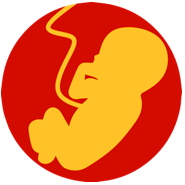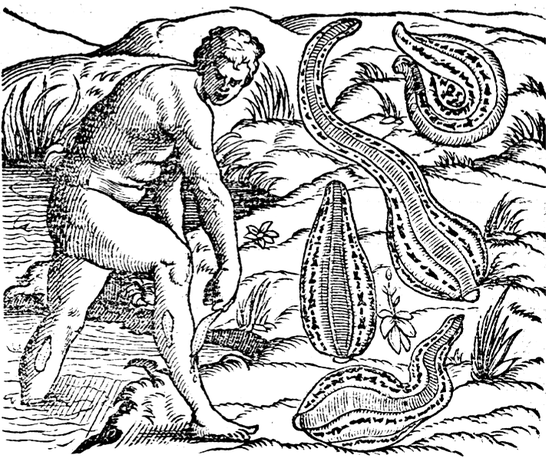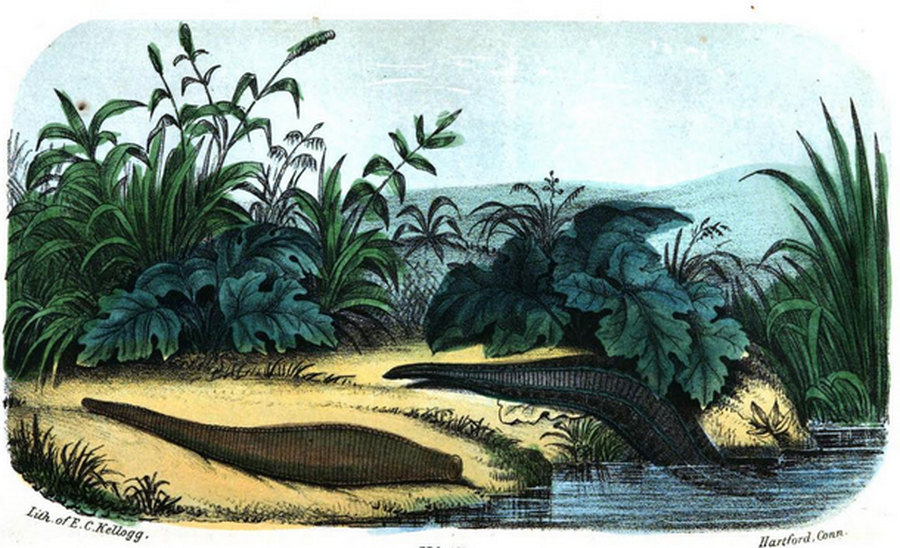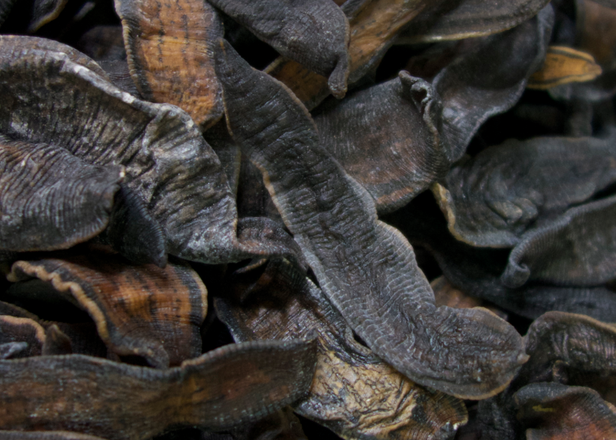Sentry Page Protection
Dioscorides Materia Medica, Mathias, 1563
Materia Medica Animalia, Peter Peyto Good, 1853
Dried Leech as used in TCM.
(Chengdu Medicine Market, Adam, 2009)
(Chengdu Medicine Market, Adam, 2009)
Entomological name:
Hirudo and Whitmania spp.
In TCM, the Official species used are:
There are around 680 species of Leech (Hirundo) in the world with over 100 species being found in China.
Over 50 species are said to have supplied the market in China which in addition to the above-named species include H. pulchra, Poecilobdella nanjingensis., P. manillensis and P. hubeiensis
Three main different types of Leech have been noted in Chinese texts:
Parts used:
Dried and prepared Leech
Temperature & Taste:
Neutral, Salty, Bitter, slightly Toxic
Classification:
K. Move the Blood
Hirudo and Whitmania spp.
In TCM, the Official species used are:
- Hirudo nipponica
- Whitmania acranulata
- W. pigra
There are around 680 species of Leech (Hirundo) in the world with over 100 species being found in China.
Over 50 species are said to have supplied the market in China which in addition to the above-named species include H. pulchra, Poecilobdella nanjingensis., P. manillensis and P. hubeiensis
Three main different types of Leech have been noted in Chinese texts:
- Small Leech, or Gold-margined Leech; less than 5cm long (considered best)
- Large or Wide Leech
- Long and narrow Leech, also called Willow-leaf Leech
Parts used:
Dried and prepared Leech
Temperature & Taste:
Neutral, Salty, Bitter, slightly Toxic
Classification:
K. Move the Blood
Uses:
1. Clears Stagnant Blood, Reduces Swellings and Masses, Eases Pain:
-Amenorrhea, Dysmenorrhea
-immobile Abdominal Masses,
-internal Bruising from Trauma, as well as Fractures.
-used as an Abortifacient, and for Sterility from Blood Stasis.
-irregular blood cells, toxic conditions of the blood, Tumors and Cancers, especially of the Uterus.
-used similarly in the west from 1903 in the form of the extract 'Hirudin'.
2. Promotes Urine:
-Edema, fluid retention
-Chronic Glomerulonephritis
3. Leeching:
Leeching is the application of living Leeches to draw blood.
-Long used externally to draw blood. It was used for bleeding local areas where there was congestion, pain, swelling, or tumors such as is seen in localised inflammation, hemorrhoids, scrofula, angina, hepatitis etc.
-In TCM, Ayurveda and Europe, Leeches were applied to toxic boils and swellings to draw out the poison.
4. Externally:
-ashes were used in the west as a Depilatory
-Leeches left for 60 days in dark Wine or Vinegar, then used to annoint on the hair in the Sun makes hair black.
-Venous congestion; Varicose Veins; Varicose Ulcers; Hemorrhoids.
-Acute heat and inflammation in a local area; skin inflammations including Herpes, Boils.
-Chronic, stabbing and violent Headaches from Heat or excess Blood.
-Suppressed Menstruation (applied to the ankles or lower limbs).
-Arthritic pain with dark colored joints (from blood stagnation).
-Tendonitis; strains and sprains of the Muscles; acute Trauma.
-Swellings; Tumors; Hepatitis; Scrofula
Dose:
Decoction: 3–6 grams (to 9 grams for Cancer)
Pills or Powder: 300–1500mg in (to 3 grams for Cancer)
Preparation:
1. Stir-Fried Leech:
They can be heated in ashes or toasted to yellow. Some recommended cutting them very finely then roasting to yellow to ensure no eggs would hatch.
Alternatively, Talcum powder can be heated in a Wok until it flows (moves freely), then section of cut dried Leech are added and stirred until swollen, yellowish and crisp. They are removed from the heat and the Talcum is sifted off. This reduces toxicity, and facilitates powdering for use in pills and powders.
2. Wine-Fried Leech:
Leeches are soaked briefly in White Wine/Spirit, then stir-fried until dried and yellowish.
This is traditionally considered stronger to move the Blood and relieve stasis. Modern research has confirmed that wine-processing increases anti-thrombotic activity.
3. Talcum-prepared Leech:
Leeches are dried in Talcum, then stir-fried, and kept for use.
Comment:
It is a potent anti-coagulant, hirudin being comparable to warfarin. Leech has also demonstrated fibrinolytic, anti-tumor and anti-cancer activity
Decoction: 3–6 grams (to 9 grams for Cancer)
Pills or Powder: 300–1500mg in (to 3 grams for Cancer)
Preparation:
1. Stir-Fried Leech:
They can be heated in ashes or toasted to yellow. Some recommended cutting them very finely then roasting to yellow to ensure no eggs would hatch.
Alternatively, Talcum powder can be heated in a Wok until it flows (moves freely), then section of cut dried Leech are added and stirred until swollen, yellowish and crisp. They are removed from the heat and the Talcum is sifted off. This reduces toxicity, and facilitates powdering for use in pills and powders.
2. Wine-Fried Leech:
Leeches are soaked briefly in White Wine/Spirit, then stir-fried until dried and yellowish.
This is traditionally considered stronger to move the Blood and relieve stasis. Modern research has confirmed that wine-processing increases anti-thrombotic activity.
3. Talcum-prepared Leech:
Leeches are dried in Talcum, then stir-fried, and kept for use.
Comment:
It is a potent anti-coagulant, hirudin being comparable to warfarin. Leech has also demonstrated fibrinolytic, anti-tumor and anti-cancer activity
Main Combinations:
1. Pain, bruising and swelling from trauma, Leech (1 part), Rhubarb (2 parts); form pills. (TCM)
2. Blood stasis with fixed pain:
i. Leech, Tabanus Meng Chong, Peach kernel (Tao Ren), Rhubarb (Da Huang)
ii. Leech, Clematidis Wei Ling Xian, Momordica Mu Bie Zi, Aconitum Chuan Wu, Saposhnikovia Fang Feng, Angelica dahurica Bai Zhi, Flying Squirrel Feces (Wu Ling Zhi), Earthworm (Di Long), Cinnabar (Zhu Sha) (as in Ding Tong Wan)
iii. Leech, Rhubarb (Da Huang), Scutellaria Huang Qin, Licorice, Peach kernel (Tao Ren) Bitter Almond/Apricot (Ku Xing Ren), Paeonia Bai Shao, Tabanus Meng Chong. (as in Da Huang Zhe Chong Wan)
iv. Leech, Dang Gui, Paeonia rubra Chi Shao Yao, Peach kernel (Tao Ren), Myrrh (Mo Yao), Tabanus Meng Chong (as in Mo Yao Wan)
v. Leech, Sparganium San Leng, Zedoary (E Zhu), Toxicodendrum resin (Gan Qi), Halite violaceous (Nao Sha), Tabanus Meng Chong, Amber (Hu Po), Achyranthis (Niu Xi), Cinnamon (Rou Gui), Rhubarb (Da Huang) (as in Hua Gu Wan)
3. Immobile abdominal masses, Leech with Turmeric and Dang Gui. (TCM)
4. Cerebral Thrombosis, Leech with Bezoar and Antelope horn (TCM)
5. Stroke: Leech, Panax notoginseng San Qi, Red Ginseng, Eupolyphaga (Wingless Cockroach, Tu Bie Chong), Pangolin scales (Chuan Shan Jia), Rhubarb (Da Huang) and Salvia Dan Shen. This is available as a patent medicine called ZhongFeng Capsule)
6. Menstrual pain and gynecological masses:
i. Leech, Dang Gui, Ligusticum Chuan Xiong, Achyranthes Niu Xi, Cinnamon (Rou Gui), Peach kernel (Tao Ren), Rhubarb (Da Huang) (as in Niu Xi Wan)
ii. Leech, Amber (Hu Po), Tabanus Meng Chong, Cinnamon (Rou Gui), Peach kernel (Tao Ren), Rhubarb (Da Huang) (Hu Po Jian Wan)
iii. Leech, Dang Gui, Frankincense (Ru Xiang), Myrrh (Mo Yao), Tabanus Meng Chong, Rhubarb (Da Huang), Peach kernel (Tao Ren), Ginseng (Ren Shen)
iv. Leech, Amber (Hu Po), Myrrh (Mo Yao), Dang Gui, Paeonia rubra Chi shao Yao, Sparganium San Leng, Soft-shelled Turtle Shell (Bie Jia), Tabanus Meng Chong
7. Blood Stasis with Pain, or for Masses, Leech, Dragon's Blood (Xue Jie), Myrrh (Mo Yao), Corydalis Yan Hu Suo, Aconitum Fu Zi, Dang Gui, Tabanus Meng Chong, Croton (Ba Dou), Toxicodendrum Gan Qi, sublimed Arsenic (Pi Shuang) (as in Qi Lin Jie Wan)
8. Skin Cancer, with Rhubarb and Indigo as an ointment (with sesame oil and bees wax) (TCM)
9. To stop hair growing, burn Leeches to powder, mix with vinegar and apply topically.
Major Formula
Di Dang Tang
Ding Tong Wan
Hu Po Jian Wan
Hua Gu Wan
Da Huang Zhe Chong Wan
Cautions:
1. Not used during pregnancy
2. Should not be used in cases of chronic gastritis or gastrointestinal bleeding.
3. Careful that viable eggs are not swallowed. They can be cut finely and heated until yellow to kill eggs. The fine powder is sieved to ensure no eggs are taken. A tincture is perhaps the best preparation.
Toxicity:
1. Overdose can cause nausea and vomiting. Severe overdose can cause gastrointestinal bleeding, hematuria and severe abdominal pain.
2. LD50 of subcutaneous injection of the decoction of Leech in mice was 15 g/kg.
Drug Interactions:
1. Not used concurrently with Blood thinning medicines such as Warfarin.
Main Preparations used:
1. Not used during pregnancy
2. Should not be used in cases of chronic gastritis or gastrointestinal bleeding.
3. Careful that viable eggs are not swallowed. They can be cut finely and heated until yellow to kill eggs. The fine powder is sieved to ensure no eggs are taken. A tincture is perhaps the best preparation.
Toxicity:
1. Overdose can cause nausea and vomiting. Severe overdose can cause gastrointestinal bleeding, hematuria and severe abdominal pain.
2. LD50 of subcutaneous injection of the decoction of Leech in mice was 15 g/kg.
Drug Interactions:
1. Not used concurrently with Blood thinning medicines such as Warfarin.
Main Preparations used:
Click the Tabs above for more information on this Medicine




